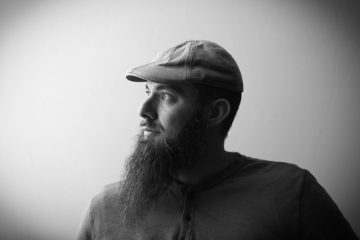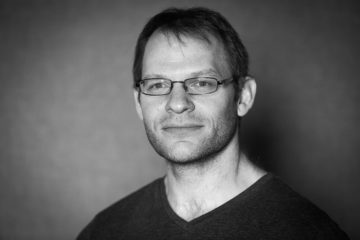This is Part Two of the two-part interview with me, Adam Williams, the creator of Humanitou.
When Yves Sturdevant interviewed me, we talked about where I come from, my Reverence photographic series, and how being a father and husband influence my art.
We also talked about how I unintentionally became a journalist nearly 20 years ago, which ultimately led me to create Humanitou in 2017. Those pieces are in Part One.
In this second part, we go deeper in talking about Humanitou itself. We get into the why behind its creation and my singular experience of nearly three years’ running with it.
We also talk about what I see in the future for Humanitou. A hint: The future of Humanitou is here … Read on to see what I mean.
So once again, here’s a bit about me, Adam Williams, and the background of my work with, for and as Humanitou.
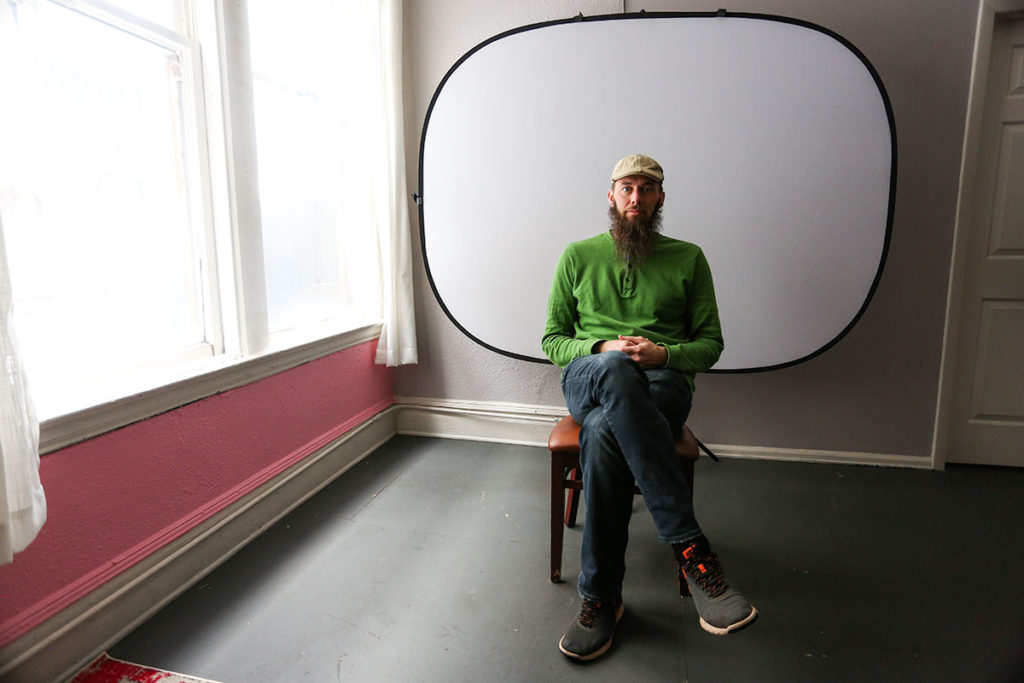
Adam Williams, Creator of Humanitou. Photographs by Becca Williams
Yves: Your very first person you interviewed, did you know that was your launching point for Humanitou or were you just having conversations with people and thought, “Later on I’m going to put this together as a collection”?
Adam: It was intentional. When I started Humanitou, I did not know if there would be 10 people look at it. I had no idea how it would go, if people I asked to talk with me would take it seriously or brush it off, and not want to be part of it.
I went to about the only people in town that we knew by name. We had taken our kids to E11 Creative Workshop, an art-based preschool in Manitou where our sons had spent some time in camps.
I went to Maria Navartne, who owns the school with her husband, Alain, and told her my idea. She volunteered Alain to be my first interview. And he kindly went along with it.
When I began, the unofficial tagline I used to describe Humanitou had to do with “creativity and humanness.” Later, I realized that the real heart of this is humanness … and I happened to be talking with a lot of artists, so creativity became the second piece of that line. It’s about humanness and creativity.
I talk with so many artists, in part, because of my curiosity about the life of artists. I’d long been afraid to try and live that life myself, and didn’t have any idea how to do it, how to even get started.
I’d dabbled with creating over the years, but didn’t really share a lot from that publicly, not in an ongoing way where I would identify in any significant way as an artist.
Then I found myself living in an amazing arts town with access to meet artists and get to know them. And I think artists tend to have a lot of experience with looking into how they feel, and with expressing that in various forms.
I was curious to learn from them. I wanted to know about the creative process, though I quickly shifted toward that humanness vein of things with my questions. I can’t — and don’t want to — get into the weeds about brush strokes and an artist’s process in that way, as much as I want to learn about the person behind the canvas, the poem, the performance the … whatever.
And a lot of the questions I ask tend to be — I don’t really want to call them selfish — but they’re personal. They’re me asking what I want to know, because I’m trying to connect to something in myself.
So, to your question, I had started Humanitou intentionally and then went to the first person. I didn’t know where it would go from there. Or for how long.
But the support for it has always been there, from the first go. My fears were unfounded. I just want to keep going with it now and growing it, evolving.
When I interview people I really appreciate their courage to be vulnerable. I try to share with each person my perspective that the more vulnerable we are in our sharing, the more helpful we are — and may never know it — for the reader or listener out there who might be going through something similar.
Yves: Do you have a vision for the future of Humanitou or are you just going with it?
Adam: Yes … to all of that. There are times I think about expanding it and having more of a formal podcast type of thing, where I potentially have funding to, say, rent a small, dedicated studio for the podcast and to shoot portraits of guests.
I’d love to talk with people more frequently than I am, and not lose time in all the transcription and related things that get tedious and slow me down. I think with the studio and podcast*, with the audio format, I would be able to provide a consistent space and, hopefully, work more efficiently.
So far, I’ve met with people in a space that has meaning to them. Often that’s their home or art studio. Often enough that’s the same thing. Sometimes it’s other places.
If I have a dedicated place where I could hang a shingle and say, this is what I’m doing and where you can find me, and move to audio publishing, I think I’ll be able to talk with a lot more people and connect a lot more dots.
That is probably the biggest piece of my vision for Humanitou’s growth and evolution, at this point. And I’m not sure when and how that comes together. I also exhibit some of the photography in galleries. And I think I’ll put together other projects in the future. I have a couple book ideas.
But being a dad comes first, and Humanitou and other things that I do — making art with my Reverence photographs or teaching yoga — those things come next. They shape around my being dad.
But I’m still getting it all in. I feel like I’m moving the needle in a reasonable way across the board at this point.
It’s been an evolution of us shaping the teamwork at home for how we do things, and me figuring out how to juggle it all, how to juggle myself with it all more than anything.
[*NOTE: Since giving this interview in November 2019 … Humanitou has established a studio in the Old Colorado City area of Colorado Springs. The Humanitou Podcast is launching in March 2020. “The future of Humanitou is here.”]
Yves: Have you interviewed your family?
Adam: My sons wanted to be part of it. I interviewed them each once, separately. Then I put it together into one post.
I’ve asked Becca if she might want to be interviewed one of these days, if we can try to pull that off in a relatively objective way, at least in a similar way to how I handle all the other interviews. She, obviously, is the person of all the people I will ever interview that I know the best.
I would like us to figure out how to treat that in a similar way as I approach interviewing someone I’ve never met. I ask everyone deep questions from that place of curiosity and would want to do that with her. Maybe one of these days she’ll be on Humanitou.**
[**NOTE: Becca did, in fact, jump in to be the first Humanitou Podcast guest.]
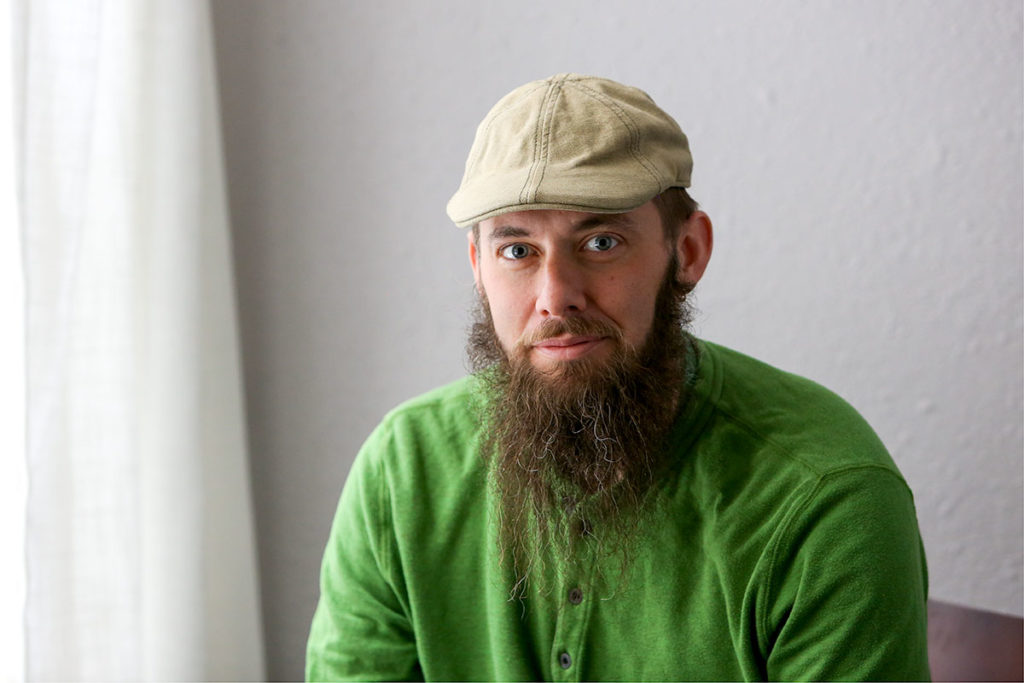
Yves: At this point, what does Humanitou mean to you? Your relationship with it has probably grown through this experience.
Adam: The part of engaging with the community and being part of it still is growing. I think that there’s more and more connection being made there, and more ways I can be involved in what’s going on around me.
The clearest difference for me is I could walk through town before and be mistaken for a visitor, a tourist, an unknown. I still can be, I’m sure, but it’s almost hard for me to walk through Manitou now and not encounter one person — or three or five — who know who I am, who know something of what I’m trying to contribute here. We can say hi and have some point of connection.
Having grown up in a small town, I think especially as a teenager, I became wary of the sense that people know your business. I was anxious about gossip, and I feared making a mistake or doing something others would gossip about. I didn’t even like when people talked about me for something good. I just didn’t like being talked about.
So I don’t like to gossip, didn’t then and don’t now. Maybe that came from my wanting to avoid how that hurts, and didn’t want to hurt others with that small town thing. Actually, I’m sure that factors into how and why I listen to people the way I do for Humanitou, with, I feel, I hope, sensitivity and discretion and openness.
I want people to know they can trust me. Sometimes what they share with me stirs emotions. Sometimes they cry their way through what they’re sharing. I want them to know it’s OK, it’s safe to do that with me.
It’s taken a lot for me to come around to the idea I’m going to put myself out there with Humanitou to shine a light on this town and in this town, and to have people know who I am when I easily could have stayed anonymous.
But it’s nice when I can walk through town and I can wave at somebody who is across the street, or I can stop on the sidewalk and have a conversation with somebody, or I can go into a business where I know who they are and they know who I am. It’s nice.
Yves: Is there a message that you’re trying to convey with Humanitou?
Adam: The word that comes to mind is compassion.
Lately, I’ve been thinking more about what my purpose is and what I’m doing. Hearing myself answer some of your questions, I’m remembering how I’ve been interested in individuals’ stories and perspectives for many years. Long before it became a profession. Long before Humanitou.
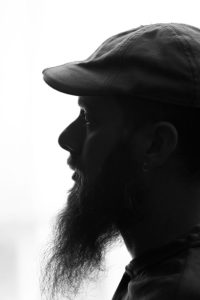 So there’s something about Humanitou for me that I feel like has to do with compassion to understand each other, to listen to each other. And empowerment through communication. Empowering understanding, some kind of clarity. Or openness to those things, anyway.
So there’s something about Humanitou for me that I feel like has to do with compassion to understand each other, to listen to each other. And empowerment through communication. Empowering understanding, some kind of clarity. Or openness to those things, anyway.
I think that’s what it’s about. Creating an opportunity for there to be connection. I want to have a voice. And I want to do good for others by giving them a safe space to share their voices.
When I interview people I really appreciate their courage to be vulnerable. I try to share with each person my perspective that the more vulnerable we are in our sharing, the more helpful we are — and may never know it — for the reader or listener out there who might be going through something similar.
There has to be some conversation somewhere on the Humanitou site that they can connect with. We’re covering more and more topics as this grows.
Yves: I have had people reach out to me because of our conversation, people who had difficulties in their childhood and wanted to share with me that it was nice to hear someone else share similar stories, and that they didn’t feel so alone in that aspect of their lives. So you are connecting people.
Adam: I am so glad to know that. Thank you.
It’s something I have felt has been possible, and has been happening, the entire time with Humanitou. I often talk about that possibility with those who appear on Humanitou, because I want everyone to know there is value in their being vulnerable with me, in sharing their story through me and Humanitou.
To actually get confirmation is great. I don’t know if I have gotten that feedback before. I’ve just trusted it’s out there, that it’s happening.
I think that’s where all the vulnerability is worth it. It’s why it’s so important. I don’t ask anyone to share something they aren’t ready to share or plain don’t ever want to share. But if they are willing to push into that courageous place and they will willingly offer it, it’s tremendous. It’s amazing.
So thank you.
I think we need more of it. We all need to be open to more of this humanness. The more of us who share these pieces of ourselves with courage and vulnerability, the easier it becomes. To share more, to connect. To feel and accept our humanness — and each other’s.
Yves: I agree. It’s nice to have these little quiet places to stop and listen to somebody. As a reader, I experience that through reading your interviews. Instead of all the hurriedness that is going on around me, I get to stop and just listen to two people have a conversation about very real things.
It’s nice to take a break from the craziness and to have that moment.
It’s a great thing that you’re doing.
Adam: Thank you. I appreciate that.
